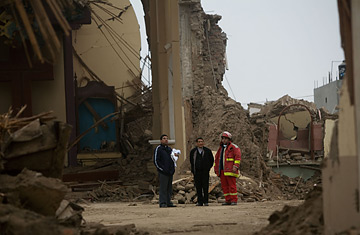
Members of a church inspect the ruins with a firefighter in Pisco, Peru, August 19, 2007.
Walter Oyarce has one of those jobs that no one wants. He heads a brigade that is clearing debris from last week's earthquake that devastated this city and several others on Peru's central coast. He directs bulldozers along narrow streets, scooping up the remains of homes built years ago out of a mix of mud bricks and bamboo-like reeds. The clean-up sends clouds of dust into the air, recalling for residents the immediate aftermath of the 8.0-magnitude earthquake that struck early in the evening on Aug. 15.
Oyarce would have been finished with his neighborhood near Pisco's fisherman's wharf if his crew only had to move debris. The streets, however, are now home to dozens of families who have stacked their few possessions in front of what were once their homes and they are not moving for bulldozers or work crews. "These people have lost everything and now we have to ask them to move away from their homes. It is the hardest thing I have had to do," he says. "There is resistance, but people cannot stay here, it is unsafe."
The situation faced by Oyarce is repeated by emergency crews throughout Pisco and the nearby cities of Chincha and Canete. The most recent official statistics from the National Civil Defense Institute put the number of dead at 503, with 1,042 people injured. The earthquake destroyed 34,410 homes, leaving more than 100,000 people homeless. The institute announced on Sunday that it no longer expected to find any more survivors. "We can't take much more of this," says Delia Alvarez, who has just bolted out of a plastic chair as another tremor — there have been more than 500 aftershocks — shakes the rubble of what used to be her house and convenience store.
Aerial views of urban areas magnify the damage seen on the ground. Whole sections of Pisco and Chincha have been leveled. The few buildings that remain standing are oddly off center, resembling a lopsided wood-block tower about to crumble. Schools and hospitals are gone and the Tambo de Mora prison, from which 600 inmates escaped after the earthquake, looks like a pile of rocks around which someone has incongruously built guard towers. Of the 91 government-run daycare centers in Pisco, only one remains.
While the government has opened more than 30 shelters, many residents have chosen to remain near their homes or move into tents set up in parks and city squares. Blue-plastic tents dot the landscape from the beach town of Cerro Azul, made famous in the Beach Boys song "Surfin' Safari," to the city of Ica, 160 miles south of Lima, the capital. Major landmarks that identify this part of Peru have been lost. Centuries old churches collapsed, museums in Pisco and Ica are now little more than debris. Even natural rock formations, including one known as the Cathedral popular among tourists, are gone, plunging into the sea.
The Peruvian government has mobilized national and internationally to address the crisis. President Alan Garcia has taken charge, moving the presidential office to an air force base in Pisco and gathering his Cabinet to work with him there. He welcomed Colombian President Alvaro Uribe, who flew down on Sunday to personally assess the damage and provide Garcia with tips on reconstruction. Early estimates put the price tag for Pisco alone at around $500 million.
Making presidential decrees a reality and getting the aid from planes to warehouses and then to the victims will be difficult. There is rising criticism that Garcia's micromanaging of the crisis is actually slowing down the process, with underlings afraid to make decisions that might contradict the president's plans for a shipment of aid. "The government is doing very much, which is important, but I think we need to leave the work at this point to the experts," says Ica Bishop Guido Brena. "There could be a moment when people think that this is being used for political benefit because of the President's close involvement. That would be unfortunate."
Government authorities reject the criticism, saying that aid is reaching people but that the need is overwhelming. Women's Issue and Social Development Minister Virginia Borra, in charge of recording supplies as they arrive, said that the government will not turn the crisis into a political shouting match with opponents. "There will be people who complain no matter what we do," she said. Right now Peruvians approve. In a survey published over the weekend, 76% approved of Garcia's reaction to the disaster.
